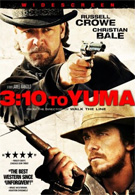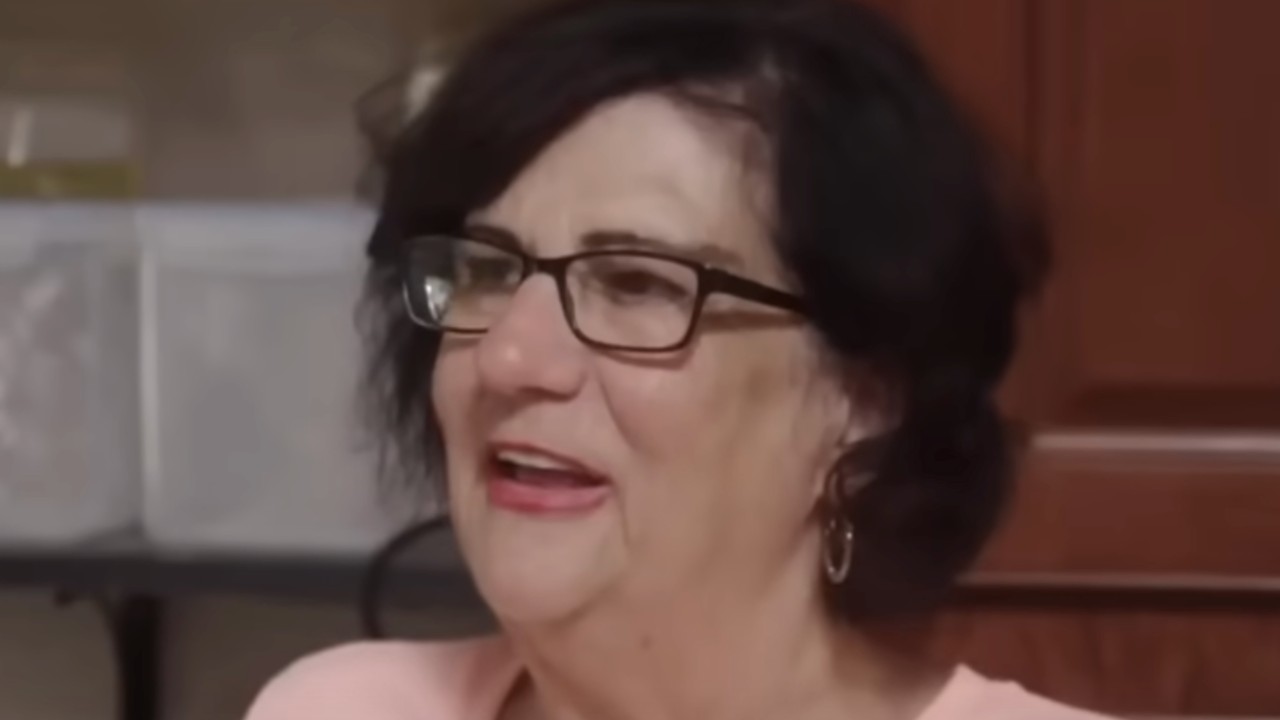Ben Wade (Russell Crowe) is a notorious outlaw, the kind that inspires tall tales of incredible carnage and brutality. His gang of ruthless thieves and murderers have been laying siege to the Southern Railroad for months when Wade is suddenly captured. Civil War veteran and struggling rancher Dan Evans (Christian Bale), desperate for money and his family’s respect, volunteers to escort Wade to the town of Contention where he’s to be placed on the 3:10 train to Yuma on his way to a swift trial. Evans joins an old Pinkerton man (Peter Fonda), the railroad’s representative (Dallas Roberts) and a timid veternarian (Alan Tudyk) brought along for first aid. Their journey becomes especially dangerous when Wade’s gang, led by the intensely loyal Charlie Prince (Ben Foster), vow to free him and kill anyone who gets in the way. When Evans’ oldest son William (Logan Lerman) joins them, full of naive admiration for Wade’s guts and prowess, the rancher must deal with his own fears and the self doubt that he will be able to get them through the mission alive. The western has been buried and revived so many times in recent years that it’s beginning to resemble one of George Romero’s stale zombies, stumbling about with only a trace memory of it’s former self. The trouble lies in the very idea of a “revival”. As director James Mangold mentions himself on the DVD commentary, this inspires contemporary filmmakers to make westerns that are about other westerns and the genre itself rather than simply going about the business of telling their own story. The films end up being crushed by the weight of their own self-importance, filled with empty and soulless homages to The Searchers or A Fistful of Dollars instead of inspiring anything real.
Fortunately, Mangold (Copland, Walk the Line) follows his own good advice with his very effective remake of Delmer Daves' 1957 “Adult” western 3:10 to Yuma. What he has done is to approach the material the way a studio director might have done in the old days and simply tell the story. Filmmakers like Don Siegel and Budd Boetticher were genuine craftsman who knew better than to get in the way of their characters and the developing drama. This craftsmanship is pretty much a lost art today as filmmakers seem to look down upon the “small” art of storytelling desiring instead to make a “definitive” film out of genre material. The great film critic Manny Farber once noted that in order to be a great director you had to at least be a competent one. Well, in an age of self-proclaimed artists and childish auteurs, Mangold is uniquely mature.
This doesn’t mean that Yuma is by any means a perfect film. But for most of its 122 minutes, Yuma is enthralling, immersing us into the lives of its two lead characters, Ben Wade and Dan Evans. Crowe and Bale both create intensely real and lived in characters, conveying volumes of meaning between their lines of dialogue. Crowe, in particular, is riveting. Like Brando in his prime, he commands attention onscreen through behavior rather than any blatant “acting“. Bale is his match throughout and between this film and Rescue Dawn, the actor has had quite a year.
The journey to the town of Contention is the focus of the film and it’s completely new to this version. In the original, the characters were locked in a hotel room for much of the running time, waiting for the train to arrive in a kind of twist on High Noon. Glenn Ford played Ben Wade in that one and most of the tension came from the complex Hannibal Lector-like head-games he enjoyed playing with Van Heflin’s nervous Dan Evans. The journey in this version allows Mangold to present a kind of odyssey through the history of the west, with vignettes highlighting miners, Chinese railworkers, Native Americans fighting for their land, and the transformation of America from an open wilderness of opportunity into corporate controlled real estate.
Most of the head-game stuff has been tossed out and replaced by a new relationship between Wade and Evans as two possible fathers for Evans’ son William. Neither man is presented as the expected “good” or “bad” man and both are shown to have their own reasons for doing what they must do. This is a contemporary concept of characterization in which everything must be made gray in order to appear truthful, but it’s never really gray since we’re not reminded of the many men whose innocent lives Ben Wade took without mercy. The problem is that the deck is always stacked in his favor. The script goes overboard in making him the outlaw version of the whore with the heart of gold. He’s a renaissance thug who can quote Shakespeare and Milton, sketch naked women as good as DiCaprio in Titanic, and draw his gun faster than the Lone Ranger. He’s even given that eight inning cliche in which the “bad guy” gets to explain himself by telling an anecdotal and dimestore Freud story about his sad childhood. Apparently, Wade became a criminal because his mother abandoned him as a kid. That’s fine as far as it goes, many criminals had troubled childhoods and absentee parents, but it’s just too much panhandling for sympathy right before the climax.
The climax is a whole other problem. The film sets up expectations for Wade’s redemption that it then ditches for a much more outlandish action scene that seems to be ported from one of John Woo’s male bonding hero flicks. Without spoiling the film’s ending, suffice it say that who lives and who dies trying to get on the 3:10 to Yuma will be a surprise to most, and not necessarily a good one.
These are slight criticisms, however. All told, 3:10 to Yuma is a fine old-fashioned piece of entertainment with great performances from its excellent cast. Dallas Roberts, memorable as Sam Phillips in Mangold’s last film, Walk the Line delivers another interesting performance and Ben Foster almost walks off with the whole film as the very unstable Charlie Prince. Not to be missed is a bearded and grizzled looking Peter Fonda, who needs someone to make another western featuring this character. Maybe he should do it himself like he did years ago with his own wildly underrated western, The Hired Hand? As for director Mangold, I can’t think of another contemporary filmmaker who has done better work under the radar of the critical community. He’s a smart filmmaker with a rare gift of unpretentiousness. I’m interested to see what he attempts next. 3:10 to Yuma arrives on DVD with a decent set of extras that cover the film’s production and historical background fairly well. This isn’t some kind of Criterion Collection version of the film but it’s better than one might expect. The film itself is presented in 2.40:1 widescreen in a nice transfer that preserves the golden tones of Phedon Papamichael’s cinematography. Included, there’s a set of documentaries, deleted scenes, and a commentary by director James Mangold.
"Destination Yuma" is the standard behind the scenes featurette presenting interviews with Crowe, Bale, Fonda, and a very methody Ben Foster who seems to be giving his interview as his psychotic character Charlie Prince. Either that or he’s really weird to hang out with. The good stuff is the footage of the heavy snows that covered their location and forced the hiring of large crews to dig up and cover the land with sand to match the continuity.
"An Epic Explored" covers the “revival” of the western genre discussed above, while "Outlaws, Gangs, & Posses" is a look at the historical aspects of the story, something Mangold himself criticizes in his commentary as he believes this isn’t a historical film at all, but a mythic one. The western as a genre has always been less about history than about the myth of how America was formed and it has its own superheroes and villains as well.
The deleted scenes show just how ruthless Mangold and editor Michael McCusker were in cutting their film. Unlike most films, almost all of the deleted material is actually good, featuring interesting shades of character. None of it is necessary, however. That’s what I mean about craft. Most filmmakers wouldn’t have the control to cut good material, but Mangold sees the film as a whole and understands that anything that holds up the story is just indulgence and needs to be dropped.
Finally, Mangold’s commentary is a very personable track with the director talking proudly about his film to the listener as though he were an old friend. Mangold is tremendously articulate speaker and his thoughts on filmmaking, art, and the world in general are very interesting indeed. It’s one of the best commentaries I’ve heard in quite awhile.
Joe Hendry Reveals How The WWE Snuck Him Into WrestleMania 41 For Randy Orton Match, And Confirms How Seriously They Take Surprise Appearances
Greg's Mom Seemed Like Another Nightmare 90 Day Fiancê Mother-In-Law, But She Changed My Mind
The Last Of Us Season 2 Episode 3 Live Blog: I'm Talking The Aftermath Of Joel's Tragedy, Ellie's Recovery And More











